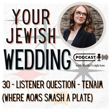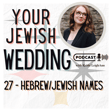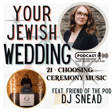Making the Chuppah Personal and Meaningful
00:00:00
Speaker
Put it on the chuppah! The more the merrier, I think. A lot of the rituals are going to be foreign to your family and friends, right? They're going to be sitting at your wedding, especially if you have a very heavily Jewish-customed wedding, especially if you call the rabbi. They are going to be sitting in a wedding ceremony that is foreign to them. But can you add that heirloom? Can you add that special touch to your chuppah?
00:00:27
Speaker
which is front and center represents your new home, your new family together. 100%. Make sure you discuss it with your rabbi or your officiant. Okay. Stick up for yourself and you know, stick up for the things that are important to you. God willing, you're only going to get married once. I mean, weddings are fun, but they're not that fun. My goodness.
Planning a Jewish or Interfaith Wedding
00:00:51
Speaker
No, you're only, hopefully you're only going to get married once. Make it,
00:00:56
Speaker
Make that chuppah, make whatever aspects are important to you, make them you, okay? And remember the four magic words. If anybody's trying to tell you what to do with your chuppah, do you guys remember what they are? Rabbi Leanne says, no. Literally just say that. Maybe they'll respect me because I have a podcast, you know, I don't know. Anyway.
00:01:20
Speaker
Are you planning a Jewish or interfaith wedding? Are you lost on
Introduction to 'Your Jewish Wedding' Podcast
00:01:25
Speaker
where to even begin planning the ceremony, let alone finding a rabbi to help you?
00:01:31
Speaker
Well, it doesn't matter whether one of you is Jewish or you're both Jewish. You deserve a guide. So take a deep breath. I promise it will all be okay. Welcome to Your Jewish Wedding with Rabbi Lian. Here, I can be everyone's rabbi, yours too. My guests and I will share everything we know to help make your Jewish or interfaith wedding full of tradition and perfectly yours.
00:02:15
Speaker
Well, hello, everyone. I am so glad to be here with you today. Autumn is here. I think that our third summer is finally over. And for the
Cultural Significance of the Chuppah
00:02:26
Speaker
moment, at least, I am just in a cozy bubble of my office with my microphone and my notes for this show talking to all of you. I'm so happy to be here. And I'm glad you are here as well. Today, we're going to speak about the chuppah,
00:02:42
Speaker
Now that in the last episode we went through all the history and background of what made the Chippah what it is, why do we have it? Let's talk about, okay, you're going to have a Chippah at your ceremony or you're considering it. Maybe you're thinking,
Blending Tradition with Personal Touches
00:02:57
Speaker
well, it's enough just to have it and people will think it's just a beautiful canopy and I will feel connected to my Jewish heritage. I don't think that I'm going to make things weird by mentioning what it symbolizes or
00:03:08
Speaker
you know, when making it too dewy. And like, listen, I understand that impulse. Quick side note, I was like, I need some art for my living room, like a big piece. I have a stone fireplace.
00:03:20
Speaker
Our house is like a 1938 build. Very cool. And I needed something for above it. I was sort of like sick of having, well, I had had a map of the United States above there, like a cool, um, anyway, I wanted to replace it and I was like, you know what? I should support a Jewish artist. I'm going to go on Etsy and find a Jewish artist and, you know, just have like some cozy Jewish vibes in my living room.
Personal Anecdotes and Cultural Subtlety
00:03:43
Speaker
And I was on Etsy for a little bit and all the Jewish art was like really Jewy. I feel bad saying that, but it's true. It was like, it was just very obviously Jewish and almost like overbearingly. So, you know, like almost like.
00:03:59
Speaker
I don't want to say preachy, but like I didn't want anything with like Hebrew quotes on it. I didn't want, you know, I just wanted some Jewish art that like represented the way I feel about being Jewish, which is obviously I really like it. So you know what? I am going to show you the piece of art that I bought because I want you to see it. I'm going to link,
Tailoring Wedding Elements to Personal Beliefs
00:04:18
Speaker
hopefully I can link to the artists to the picture of it. Let me just make a note of it.
00:04:23
Speaker
Like I wanted something and I told the artist when I ordered it, I was like, I love this because it's Jewish, but it's not like Jewish, you know? Okay. And she was like, I perfectly understand. So anyway, maybe you want your wedding to be Jewish, but not like Jewish, which I understand. You know, remember what we said back in the episode about creating a truly interfaith ceremony?
00:04:45
Speaker
you don't have to make it super Jewy, but I think that an explanation. And by the way, when we meet, or if you're meeting with your officiant and you say you want a Jewish wedding, she should ask you, like, what do you mean when you say that? Like, how Jewy do you want it to be? And usually the two qualifiers are mentions of God slash Torah,
00:05:08
Speaker
or use of Hebrew. And I'm going to urge you to, if you're concerned about the level of Jewishness in your ceremony for any reason,
Chuppah as a Cultural Symbol
00:05:16
Speaker
make sure that you specify those what, you know, when your first meeting with your officiant rabbi, whatever, really important. Otherwise you could end up feeling alienated from your own ceremony. We don't want that. Okay.
00:05:26
Speaker
But I do think that it's worth something of an explanation, especially because wedding canopies are starting to be a little more fashion. I know everybody wants to be like the Jews. It's a very nice religion and culture, obviously. But I think that in the past few years, in the post-COVID wedding boom, a lot of people are trying to figure out what can be a unique and beautiful setting for their ceremony.
00:05:51
Speaker
And even if it's not a religious ceremony, which most ceremonies I'm learning are not. Like in the United States, most wedding ceremonies are not religious ceremonies, because guess what? A lot of people aren't religious. But a lot of those people are like, you know what is beautiful? That thing that they have at Jewish weddings.
00:06:13
Speaker
So, you know, especially because of that reason, not saying it's bad, but like, if it's important to you that you have a Chippah because you're Jewish or because you're connecting to your Jewish heritage, please, you know, have your officiant throw an explanation in there or put an explanation in your wedding program if you have one of those.
00:06:29
Speaker
And try to think of some way that it, you can make it yours, you know, not just like a generic one. Like, even if it's just the same flowers that are in your bouquets or if you're a bride and groom, if, you know, there's a certain flower in the groom's boutonniere and the bride's bouquet, you know, maybe put them up there together. And that represents that you're coming together into one home. I don't know. It doesn't have to be like obvious or weird. Okay. That's what I'm saying. But
00:06:59
Speaker
I want you to think about how can I make sure that people understand that this is important to me, um, Jewishly. Okay. So as we said in the last episode, Chappas are fashion. Everybody knows it. It's very hard to make a Chappa look ugly.
00:07:17
Speaker
Okay, however, there are endless ways, endless ways to include your lives and your families and your heritage, both of your heritages, symbolically in your huppah. And I really encourage you to think about how you can do that. You know, I know that the rest of your wedding, you don't want it to be just like everybody else's wedding. Why would you want your huppah to be like just like everybody else's huppah?
00:07:39
Speaker
Make it yours. It symbolizes your new home together. Well, that's one explanation of its most common explanation of it symbolizes your new home together. But it's not a religious symbol, right? It doesn't have to have anything to do with God. It doesn't have to have anything to do with like Jewish suffering in the
Incorporating Heritage into Weddings
00:07:55
Speaker
desert. I just happen to like that. You know, the glamping, you know, I like tents just as much as the rest of the religion does. Okay.
00:08:01
Speaker
But it is a cultural symbol. It's a traditional symbol. And we talked about all its meanings in the last episode. We might mention a few more in this episode. Just like all the other aspects of a Jewish ceremony that are the same, you as a couple should choose what your couple looks like and what it includes.
00:08:20
Speaker
you should be in charge of what the officiant says. If you have an officiant who is going to make the wedding a little Jewy, do you want your officiant to find the explanation for your Chippah on chat GPT? I don't think you do. So, you know, you've put
Outdoor Chuppahs and Romantic Roots
00:08:36
Speaker
in the time to listen to these podcasts. God knows they're not short. Make sure you say, hey, could you explain the Chippah like this? Okay, share the explanations that have meaning to you.
00:08:45
Speaker
Better yet, find a poem or a song you both like that speaks to those explanations and use that in your wedding. I always ask my couples if the meaning I'm going to share is okay, right? So if we've sat down in a meeting and they've said, hey, what does the chuppah represent? And I told them some of the things I just mentioned in the last episode and they say, oh yeah, okay, that sounds good, whatever works. When I write the outline for their approval,
00:09:11
Speaker
Okay, so I write an outline of each and every step in the Jewish wedding ceremony and in their ceremony as a whole and then if there is a choice of explanations for example like with the smashing of the glass with the chuppah with the ring exchange I make sure that the explanation I'm going to share
00:09:27
Speaker
is the one that they like. You would be surprised how many people want explanations like it's just like Abraham and Sarah's tent. You never know what connections people are gonna have to like Jewish stories, Jewish traditions. And so make sure that you're okay with all the explanations that your officiant is gonna share. That goes with every single episode of this podcast, obviously, but it doesn't hurt to remind you guys. I'm not nagging, I promise.
00:09:54
Speaker
And, you know, as far as your ceremony vibe, you're like, is that even a thing? Like what? Yes, there are many different ceremony vibes. And I will do a whole episode on how you guys can figure that out together with your officiant or your rabbi. Okay. So let's talk about the setting for your chuppah. And you may hear me using chuppah interchangeably to mean the Jewish wedding ceremony or Jewish interfaith wedding ceremony in this podcast. Whatever. It's the chuppah.
00:10:20
Speaker
There's this idea, and it is one of those ideas in Jewish culture that people think is like the law about chuppas. Okay, are you ready? There's this idea that a chuppa has to be outside. Like, you know, just like a Catholic wedding, you're not allowed to have them outside? Some people think that there's a rule, some kind of rule somewhere. I don't know who made the rules in these people's heads, but there's some kind of rule that the chuppa has to be outside.
00:10:50
Speaker
So I guess like if you're
Accessibility and Tradition in Chuppah Design
00:10:51
Speaker
a Jewish person marrying a Catholic person, you know, good luck to you. Luckily for you, it does, that is not true. The chuppah does not need to be outdoors. It is like most things we're going to discuss, not a law, but a custom. And it actually has a really romantic explanation for why the custom developed to have Jewish weddings outside. Okay.
00:11:12
Speaker
There's a verse in the OG soap opera, the book of Genesis from the Torah, very first book of the Bible, that we should be able to see the stars at our wedding because in that book of Genesis, God promised Abraham the first Jew that his descendants would be as numerous as the stars in the sky, like direct quote. This brings us back to procreation.
00:11:37
Speaker
as an emphasis in Jewish wedding ceremonies. Don't worry, this isn't the last you're going to hear about it. So there's an idea that if you are under the stars, then you will be blessed with many children. Listen, there's also, quick side note, the origin of the phrase mazaltov or mazaltov
00:11:57
Speaker
Mazal refers to the constellations of the stars in the sky and Tov means good. So Mazal Tov literally or Mazel Tov translates to a good constellation and it comes from this idea, not a Jewish religious idea, that our lives are sort of marked and governed by the specific sky pattern.
00:12:18
Speaker
It's actually probably like a Persian thing. I don't know. Somebody who
Chuppah Personalization and Materials
00:12:21
Speaker
knows more about like astrological religious connections, email me at your Jewish wedding podcast at gmail.com. I want maybe come be a guest on the show and we'll talk all about Mazel Tov. But the idea is that because your wedding is such a beautiful event that anytime we look up at the sky and it looks like the sky that was present at your beautiful wedding ceremony, God willing, then it is
00:12:46
Speaker
a lucky or a happy pattern of stars to be under because your wedding made it happy. And so anytime we have it in the future, it's going to be a good one. Like this guy, this is going to be a good one because you guys made it good by having your wedding under this masal, under this constellation of stars. Cool. Okay. So there's probably also the idea that you want to be under the actual masal when you get married, like right under it. Okay.
00:13:12
Speaker
But that is, yes, it is a strong idea. It's a pretty old-school custom. However, there's plenty of precedent for an indoor chuppah. I found lots of old, old photos of weddings. I found illustrations from before photos existed where the chuppah is inside the synagogue, right in front of the ark with the Yeron HaKodesh, where the Torahs are kept inside there.
00:13:35
Speaker
So like right on the Bima, which is sort of like an altar in the church. And even in this one picture, I saw the bride and the groomer like sitting down. I'm going to try and find a link. Here, let me put down the show notes. So I'll try and find that for you. If there's no link there, I'm sorry. I guess that means I forgot about it. I'm trying real hard guys. Okay. So it is okay to get married inside of a shul, inside of a synagogue. Perfectly fine. Okay. Don't worry about it. Um,
00:14:05
Speaker
So there are actually some centuries-old halakhic opinions that it's bad luck to get married indoors because you can't see the stars. So it's like you're rejecting future children. God forbid. No, I know that none of you are doing that. And it makes me think, what did these guys think about daytime weddings? People get married during the day all the time. They can't see the stars. Are they not going to have kids? Eh. But these rabbis, and they're like, whatever. Why were they even talking about khabas? I don't know. They basically said that if you get married initially and you have bad luck, you only have yourself to blame.
00:14:32
Speaker
What? That's sofa cocca. Anyway, I know for a fact that there are many shuls. And here's an interesting tidbit about synagogues. If you go inside a synagogue and you notice this, now you'll know why. There is a built-in skylight in many synagogues. Beautiful windows that let in the skylight, obviously, but also allow you to...
00:14:52
Speaker
see the stars okay so if you have uh a wedding planned and maybe it's planned to be outside but um you live in the midwest where it could be raining any second you know maybe it's cloudy maybe it looks like it's gonna rain maybe it's actually raining if you need to move it inside because you don't want your guest and yourself to be wet on your wedding day then you still can see the stars
00:15:15
Speaker
Yeah, wonderful. So, but it still makes me wonder, okay, then what if you're inside the synagogue and it's cloudy or it's raining, then is that bad luck?
00:15:23
Speaker
because the stars are still like there. It's not your fault, it's cloudy or raining. I don't know, tell me what you think. Okay, so now you know why there's a skylight in like so many synagogues. So I actually think this whole outdoors thing, it goes back to Judaism's aesthetic of like universal accessibility. Okay, let me explain. This idea that we're all equal at certain times of our lives is true for different life cycle events, most notably funerals.
00:15:53
Speaker
So at a Jewish funeral, every person who has a Jewish funeral is buried in the same quote unquote clothing, which is not really clothing at all, the same garments,
Deeper Symbolism of the Chuppah
00:16:06
Speaker
and everybody gets the same coffin. Like in Israel, you don't even get a coffin. There's no, you know, you go straight.
00:16:12
Speaker
straight in. And the idea for that is, you're not even supposed to have really fancy funerals. In Jewish tradition, funerals are just very bare bones. Why? Because everybody's equal in death. And when the person is not alive to sort of speak up for herself, you don't want anybody to think that she was a better person because she had a fancy funeral.
00:16:33
Speaker
But the idea is, I guess similarly, that simcha or joy is something that all of us can and should have access to. Okay, so if we get the idea that we can only have a wedding, if we have a very fancy chuppah, if we can afford a lot of flowers for it or whatever, it might discourage people from feeling comfortable having a wedding and inviting people to the wedding. And it's a big mitzvah, actually, it's a big commandment in Jewish tradition to make brides and grooms happy, like to help them celebrate on their big day. Isn't that sweet?
00:17:08
Speaker
So, you know, if we have a chuppah and we know it's supposed to have four poles and we know it's supposed to be outside, like how fancy could you really make it? You know, a chuppah is supposed to be simple. It's not supposed to be show-offy. And we're saying that everybody has access to this happiness of standing under a chuppah and building a home together. Now, I'm not shaming you
Creating Heirlooms with Chuppah Design
00:17:32
Speaker
like if you had like a super bougie, fancy chuppah,
00:17:35
Speaker
Like I said, enjoy yourselves. I'm very happy for you. But I'm saying I think that that's maybe where the origins of this idea that, like, no, it's just four poles and it's just outside, like, because that way everybody can have access to that custom and that marker of Jewish celebration, which is, like, very, you know, social justicey. I like it. So it's, you know, the simplicity is aesthetic and tradition, which is nice.
00:18:01
Speaker
So as we saw in our historical text in the last episode, the idea of the Chippah being a canopy stretched across literal poles or branches is an old one, okay? So think about it, in 200 CE, there was no Jewish wedding Instagram, there was no Etsy, there was not even florists.
00:18:17
Speaker
Okay, so if you think about it, hoisting a large cloth over a couple of times was probably a pretty special thing in itself. Like it's instant drama, right? Well, we're making drama. Like I know that we live in tents and whatever. I talked all about tents in the last episode, but like this is drama. It's beautiful. It automatically makes something fancy. Like when you hang up the happy birthday sign in your dining room, when you hear like one of your kids friends is coming over for Shabbos and it happens to be like their birthday or their birthday weekend, you put up the sign, you put up a couple like little streamers, instantly festive.
00:18:45
Speaker
Right? Same thing with the Khapa, I think. And it does have the benefit of being that automatic focal point. It draws everybody. They know exactly where they need to look. And there is no size requirement for the Khapa. It should be pretty small because it's meant to be a space for just the two of you. Okay, we're not putting out the tent in the backyard for the tailgate. It's a house.
00:19:06
Speaker
symbolic house and you two are the only foundation. Okay. But so now I talked about simplicity, but you're like, okay, rabbi land, you told us how you were going to be able to make it hours, how we were going to be able to customize it. Don't worry. I'm here for you. So some points, the chuppah can be any color. It can be decorated with literally anything. Okay.
00:19:29
Speaker
So speaking of the poles, all right, we've talked about birch chuppas. We've talked about metal chuppas. I have a couple who built a chuppa that had four by fours as the corner. It could be PVC pipe. I've seen people do. Anything that you can imagine turning into a pole to hold up a chuppa that's at least like eight feet tall because it's shorter than it sounds, eight feet tall. You want your chuppa to look like the Whomping Willow from Harry Potter with the blue car stuck in the corner? Enjoy. Cool.
00:20:00
Speaker
You want it to look like an actual tent, because you guys actually love camping fine. There
Integrating Various Cultural Elements
00:20:05
Speaker
is a custom that stretches back a couple hundred years, I think, that when a baby boy was born, they would plant a cedar tree. And when a baby girl was born, they would plant an acacia tree. And then they would use branches from those trees, which I guess were pretty fast growing trees as the hubbubbles.
00:20:29
Speaker
So you really can use anything. Like if you guys like to go hiking somewhere and it's, I don't know, maybe there's like a lot of pine trees, then put pine boughs on it or whatever, okay? So.
00:20:43
Speaker
I have a Pinterest page. I know it's very old school, but it's like, man, it's so easy to pin things. And there are so many beautiful help us. So my, my most populated Pinterest page is actually the one with like hub ideas. Cause I like to point people towards that. If they ask me like words is really stumped. I will tell you, I got married 19 years ago. Pinterest was not a thing. Wedding Instagram was not a thing. Okay.
00:21:05
Speaker
Sadly, for all my chuppah ideas, not for me, I am never getting married again. I've said it once on this podcast, I've said it twice, I'll say it again, never getting married again. So this Pinterest is like literally just for you guys, but I have fun. There are many things about contemporary weddings that I could not have cared less about. And even today, I think I would be like, nope, don't need that, don't need that, don't need that. But I personally would have 100% had at least two chuppahs.
00:21:34
Speaker
There are just too many kinds to choose one. Like I am not joking with you. I don't know if
Final Thoughts on Personal Values and Heritage
00:21:40
Speaker
I would have split my ceremony in two. Maybe I would have had like the ketubah signing under one. Maybe one would have looked like the whomping willow and then maybe one would have been like the classy metal. I don't know. But God willing, we all only have one wedding. You choose one chuppah. If you want to have two chuppahs, don't count on getting married again. It's not, I don't think that sounds fun, do you? Okay.
00:21:59
Speaker
So how should you as a couple go about figuring out what kind of chuppah you should have for your wedding? Well, first of all, I always say this, close your eyes and imagine what does your wedding ceremony look like? If you're imagining a chuppah, what does the chuppah look like? Copy it. Maybe it is the metal poles and the simple white canopy. Maybe you like the symbolism of a simple white canopy because it's a blank slate. You guys are starting new.
00:22:24
Speaker
Maybe it's just your aesthetic and you wanted the chuppah to be beautiful and not standing out from your photos and that was important to you fine. But remember the chuppah is representative of your home together and everything that each of you is bringing to it and then everything that you want your new home to be together. So I'm going to encourage you to make it reflect that idea as much as you can, as much as you want to, the best of your ability.
00:22:50
Speaker
And listen, maybe a value in your home is that simplicity and that accessibility and that blank slate. And you are having the white cloth. We don't have to give an explanation of the chuppah in your wedding ceremony, not the details, not the design choices. That's not necessary. But I do want you to have a connection to it, okay? So just think about, what does this represent? Why do I like this, okay? Because home is such a central concept.
00:23:17
Speaker
to not just Jewish weddings, but like all of Jewish tradition, everything Jews do is really centered around the home. Like, yes, we have synagogues and they are important, but like, do you know how many holidays they're just celebrating in your dining room? Hello, Passover. Okay. So home is really important. What does home mean to the two of you? So because you each are coming to this marriage and you're building this new home with plenty of
00:23:39
Speaker
influences and plenty of parts of your past that you want to honor and hold up and move forward and pass on to your children, think about including family heirlooms in your chuppah. I really want to encourage all of you, the Jewish people in the couples, the non-Jewish people, what are important things, objects, or symbols from your heritage, from your upbringing, from your past that you can include in that chuppah.
00:24:08
Speaker
If you don't have anything, like, oh, Rabbi Lian, you know, they came on the boat through Ellis Island. They lost everything. We don't, there's nothing. We got nothing. Fine. Let's think about heirlooms in the future tense as well. Fine. You don't have a family kiddush cup. You don't have a prayer shawl. You don't have anything that comes from your family of origin. You don't have Amantia from your great grandmother. You've got nothing.
00:24:32
Speaker
Can you imagine something that you would want to be important in your family, in your future family, okay? An object, a piece of cloth, anything, a quilt. One thing we talk a lot about when I talk with my couples is that each simcha, every single Jewish celebration is that chance to add a new heirloom into your family tree.
00:24:54
Speaker
And when you use that object at a wedding, it takes on the importance of being something that you chose to use for a special occasion. Whether or not it just came in the mail from Etsy last week, that's fine. And because it was used at your wedding and as part of your chuppah, it gets like the good vibes from that day. It carries the memories with it. You know, every time you look
00:25:18
Speaker
at that quilt or that tablecloth or that bunch of flowers. Maybe it's like a copy of the bouquet your grandmother carried and you're going to use it as a decoration for the whole book. Whatever it is, anytime you look at that object or you look at the photos of that object, automatically the memory of grandma is going to be recalled for you.
00:25:39
Speaker
or automatically you're going to be like, oh my gosh, that cup we chose for our ceremony, let's use that for God willing, our baby naming, or let's use it for Passover or Shabbat. It carries with it the memories and the love that you gave to it by including it. OK, so oftentimes I have had a couple who's completely stumped about what they can contribute to the Kabbah, and I think sometimes oftentimes they feel bad about that. Seriously, you all feel so guilty about so many things, especially related to Judaism.
00:26:09
Speaker
don't. So we're going to take a quick break and we will come back and I will give you some ideas for what to include in your chuppah if you're stumped and also tell you about some of the things that some of my other couples used for their chuppah when we come back.
00:26:35
Speaker
my headphones back in so i told you i have had a lot of couples who are stumped i asked them is there anything you want to include in your hupa anything that represents you anything that is an heirloom anything that you want to be special to your family moving forward and they're like uh
00:26:51
Speaker
Now, I will say that this Jewish wedding planning stuff can be really overwhelming, right? Because it's a lot. You don't know. So don't worry. Okay. That's why you're listening to this podcast to get some ideas. That's why I linked my podcast. Excuse me. I linked my Pinterest page with chappas on it to the show notes. So you can go click around. You will, for every chappa you click on, it'll give you like 10 more at the bottom. So Zagasan, enjoy yourselves.
00:27:15
Speaker
I encourage, one of the things that I love to encourage couples to do, because I know by the time you talk to me, y'all have already spent so much money. How much did you spend on your flowers? Thousands of dollars. You've got, which, listen, I'm friends with a lot of florists, worth every penny. Beautiful work, okay? But you're spending, you already paid the kid or you paid the cake lady. You paid your photographer. You're like, now I have to make the chuppah custom as well.
00:27:44
Speaker
No, if you are like stressing about your chuppah, my go-to piece of advice is for the cover of the chuppah, go buy a literal tablecloth.
00:27:57
Speaker
like an online $8 tablecloth, whatever. If you use like a white, cream, green, whatever color tablecloth, like, you know, get a 10 foot square tablecloth, they exist, use it on top of your chuppah, then you can either use it as a tablecloth later or fold it up, put it somewhere special, say, you give it to your children, your grandchildren, this is the tablecloth we used for our chuppah.
00:28:20
Speaker
Instant heirloom. Do you see what I'm talking about? Maybe you have a sibling who wants to use it. Maybe, you know, your whole friend group is having a wedding and they're like, gosh, that Chupa's beautiful. Maybe everybody wants to use it. And now you have that connection forever. Maybe a couple wants to take the canopy, the tablecloth down off the top of the Chupa and ask every, give everybody at your wedding a Sharpie at the reception and have them sign it.
00:28:44
Speaker
It's not a holy object, right? You don't have to vacuum-steal it or treat it with care or whatever. Its entire importance is that it lived through that moment of space and time that you did. And that's why it's important. It absorbed all that joy, well-wishes, all the things. And every time you look at it, whether it's been signed by everybody at the reception or it has an inappropriate drawing on it or whatever it is, you will remember that day. And that's part of the whole goal, right? And I will say this again.
00:29:13
Speaker
really important, the entire significance of your specific chuppah design, the only reason it matters is because it means something to you. If somebody tells you there's like a special requirement for it, if somebody tells you that your chuppah design is disrespectful or shabby or weird, tell them
00:29:38
Speaker
Tell them the four magic words that we went over in the last podcast episode. If you're listening to this solo episode and someone tries to tell you something to do that you have to do for your Jewish wedding, I want you to remember these four magic words. Are you ready? Rabbi Leanne says no. No, it's not too shabby. No, it's not too simple. No, it's not too fangirly. Whatever. Your chuppah should be important to you. So anyway, back to my Pinterest page.
00:30:07
Speaker
I have only pinned like 30 chappas and I say only because there are thousands and thousands more. Go there. You will see the diversity of chappas that you can use. There are ones with flowers, different cloths. Yes, of course, that's what we expect, but there are also ones with streamers and shawls and hand embroidered ones.
00:30:26
Speaker
and quilts, and the list goes on and on and on, okay? Your huppah can be more things than you can even imagine. So with regard to your family heirlooms, if you're thinking about like, okay, but how can I possibly include a family heirloom? Like, my family heirlooms are not big giant cloths, okay? First of all, there are ways we'll talk about in a second, but a lot of people ask me if it matters if the heirloom is a Jewish heirloom.
00:30:50
Speaker
So I'm pretty sure they're thinking of the tried and true Hupa cover, which is a Jewish prayer shawl, right? You've seen it a lot. There's like, it's like a big, like a...
00:30:58
Speaker
rectangular, usually white shawl thingy with black stripes or blue stripes and it's got tassels on the sides called tzitzi. Of course, those khabas with the prayer shawls on top are lovely, especially if it's been passed down through your family or if it was like your parmitzvah prayer shawl or something like that. So you might be thinking of that and saying like, okay, well, that's a Jewish heirloom.
00:31:21
Speaker
But no, it doesn't have to be a Jewish heirloom. It can be any kind of shawl, any kind of tablecloth, any kind of quilt. It can have anything you want on it, okay? If it is, I don't know, the veil from your first communion, or maybe your mom kept a bunch of your onesies, or
00:31:42
Speaker
t-shirts from concerts you went to together and they want to make a canopy out of that. Enjoy. Okay. I will give you some examples of chappas that my couples have had that involve family heirlooms. Okay. Are you ready? One couple used his father of blessed memories prayer shal. So his father passed away when he was a teenager. Um, they used his father's prayer shal. We talked about it a lot. It was very emotional as part of the ceremony.
00:32:06
Speaker
This is a couple who had done something really cool, though, that I want to talk about because we considered something different for their chuppah. They asked all their guests to send them one-line mantras for living a good life. Like, how cool, right? The couple did consider writing all of these on scraps of cloth or on a larger cloth and using that to help cover the chuppah. In the end, they decided that they wanted the groom's father's tallest to stand alone, his prayer shawl to stand alone, though, and that understandable, right?
00:32:35
Speaker
They wanted his dad to have a big part in the ceremony, and they just didn't want to obscure it with anything. So it was just that prayer shawl and the four poles, fine. We did actually use those mantras in a different setting, though it was very cool. And we will talk about that when we get to the seven blessings episode. But if you want to know, just send me an email, yourjoshweddingpodcastatgmail.com, and I'll tell you all about it.
00:32:54
Speaker
So, one couple, I believe, they did use the bride's bat mitzvah prayer shawl. Well, one of the bride's bat mitzvah prayer shawl. There were two brides in this wedding. They had built their own chuppah structure. So, their idea was they had built the chuppah structure together. So, the pools, it was super solid. This is the one that was like four by fours.
00:33:11
Speaker
They moved the whole structure to their backyard after the wedding, super sturdy. And then obviously they took the bride's bat mitzvah prayer shawl off of it after the wedding, but they stored it away. And then when they had their first baby, they wrapped her up in the prayer shawl and they took everyone, all their guests at the baby naming out to stand under their hupa structure.
00:33:34
Speaker
And now, instead of being on top, the prayer shawl was wrapped around the baby. It was so nice. I loved it. And I think they said they were thinking about using it for a sukkah. But, you know, I don't know if they did that. Anyway, one of my couples hung a bunch of stuff on their chuppah. So there were at least two family prayer shawls up there. And then along with that, one of the brides hung her family's tartan.
00:33:54
Speaker
which is a Scottish woven pattern, I think, that's particular to each family, like a family crest. They were just showing all of the influences and memories that they were bringing to their married life and home together in hopes to carry it forward. They were both Jewish, so maybe they had three prayer shawls. If you're listening to this tone, I think there were three up there, plus the tartan. There's one on each corner. I don't know. It was very cool.
00:34:15
Speaker
So the other important thing in terms of heirlooms you can consider is the actual structure. So I had a couple who had this giant tree in their backyard. They were planning to use some of the branches from that tree to either create the structure or decorate it. When they had bought this home, I think this is the story. Correct me if I'm wrong, guys, if you're listening.
00:34:34
Speaker
And when they had bought this home, that was like one of the things that they loved the most about the home was like the tree in the backyard. And for the bride, especially, I think she had ever had a tree like that in any of the places she lived. And it felt like she was really putting down roots. It felt safe and permanent to her and she really wanted to incorporate that tree. I loved it, obviously.
00:34:53
Speaker
So they were going to put some branches from that tree on the khabat. They ended up not doing that because they didn't, they were like worried about bringing bugs into the fancy hotel, which I get it, it's understandable. So instead they used one of the branches to handcraft their kiddush cup instead, which was very cool. Like this guy has like a lathe and then he coded in something. I don't know, it was really cool, the kiddush cup. So, and then obviously this thing with the trees makes me think about
00:35:20
Speaker
the tree that was planted at birth, you use branches from that for the chupa. But I don't know, maybe you guys are like nature people. Maybe you both really like hiking or, you know, like I said, like maybe you have a favorite tree. People have favorite trees. Some people like birch trees. I really like those red maples. And especially if it's like got seasonal blossoms or like colored leaves and you want to use that. It's like a favorite memory for you.
00:35:47
Speaker
You know, anything goes, guys. So anyway, when... So anyway, and I meant to say that the types of trees that were traditionally planted for boys and girls when they were born and then used in their chuppah are actually mentioned in the Bible as the type of wood that was used. Remember the last episode we talked about God's tent among the Israeli encampments. God had a fancy tent.
00:36:12
Speaker
and it specifically mentioned those kinds of wood. So it's kind of like calling God's presence into that space if you use the same type of wood. So any kind of symbolic wood for any reason, maybe it's mentioned in your favorite book. Put it on your huppah. Great.
00:36:27
Speaker
So now, let's talk about future heirlooms. Okay, we've talked about past heirlooms. Let me give you some examples of couples of mine who have used future heirlooms for their khaba. Okay, there was one couple that was really at a loss over what to use for their canopy, but the bride was like really into this idea, which I love. And she was like, no, no, I do want it to be really meaningful. Like, you know, what can we do? So I said, buy a literal tablecloth. I cannot say this enough.
00:36:57
Speaker
and just make it the tablecloth that you guys use for special occasions. So anyway, they had a themed wedding that was actually kind of themed around the location, the venue that they had the wedding. It was the national aviary in Pittsburgh. So it was like birds. They love birds, love zoos. It's like their thing as a couple. So they found this beautiful tablecloth that involved lots of
00:37:20
Speaker
cranes and pelicans, which were the birds that were in the exhibit room where he proposed to her. So they used that as their hupa cover. I'll try and put a link to the image in the show notes or like the blog post where I talked about their wedding.
00:37:36
Speaker
And you can see it. So cool. All right, now there's another couple that I have coming up. I am actually, we are using my birchpole chuppah as the structure at their ceremony. But they didn't, like I have a cover, like a generic cover that I bring, and actually it is like a literal tablecloth.
00:37:54
Speaker
And if a couple uses it, I will just give it to the couple after the ceremony so that they have it. But they had this situation where I said, you already are spending so much money. They had chosen the linens for their ceremony. And there was one pattern that the bride loved. She loved it so much.
00:38:14
Speaker
Surprise, surprise, it was so much more expensive than the plain colors. And so their compromise was that they could have the linen pattern that she loved, but only for the sweetheart table. So they said, we are going to take the sweetheart table tablecloth, use it for the chuppah canopy.
00:38:31
Speaker
And then we will always remember that that was our sweetheart tablecloth. Isn't that clever? But you know, I have also seen people on purpose create hoopa covers that will become heirlooms like they make quilts. They ask everybody to send a little scrap of fabric from something that represents some time they spent together. Or they will print pictures on squares
00:38:53
Speaker
And make it into a quilt or a tapestry, especially, guys, if you have a bubby or a mom or a tailor in your family who needs something to do to be really honored. Have them make you something, a quilt. Collect different pieces from every single one of your guests that are important. I have had a couple who had a family heirloom that was really important, a rosary. The grandmother's rosary and the grandmother was a blessed memory, not actually at the wedding because she had passed on.
00:39:21
Speaker
They were considering hanging a rosary there, but I think they decided against it. I think it was part of her bouquet instead, or maybe just under the chuppah. But I've seen couples with Hispanic backgrounds. They have a mantia, which is, I guess, like a dressy shawl, or one used for special occasions that was used in, oh, church, because you had to cover up your shoulders in the Catholic church. So they use the mantia from different events in past weddings.
00:39:49
Speaker
you know, not Jewish, but it was a beautiful family heirloom. I think I actually mentioned in the episode about truly interfaith ceremonies, actually, that in some Catholic traditions for weddings, they will use something called a nuptial veil. And that is explicitly explained as representing the protective clouds when the Jews were wandering the desert. So it's like a Catholic tradition that has a really Jewy explanation. Very interesting.
00:40:13
Speaker
And that is actually just holding a veil over the couple while they're kneeling at the altar for some prayer, which is the same vibe as a kappa. So if you have a nuptial veil that runs in your family or that belongs to you, even like the church that you're a member of, ask if you can borrow it and bring it to the kappa. That's fine. I want it to represent you. I want it to be something that you have a really strong connection to.
00:40:35
Speaker
that is always part of your memories of that day, okay? Now, of course, in the interfaith ceremonies episode, we mentioned the mandap, which is an Indian wedding tradition. It's a cultural tradition not tied to any specific religion in India. And a mandap looks basically like a khapa, except there might be like a little more on the sides in a lot of cases. And then it's also on top of a platform where the couple sits.
00:41:00
Speaker
Lots of pillows and stuff is really cool. And in Indian culture, from what I could find, there are explanations of why the mandap is used for weddings that are different from explanations for the chuppah. So have your officiant, when she is explaining the chuppah, also have her, if one of you is Indian, or of Indian descent,
00:41:22
Speaker
have her include those other explanations. I think it's like for the four elements of the earth or something like that, okay? It's absolutely fine. The chuppah is cultural, not religious, okay? It doesn't have to mean anything about God unless you want it to. So if you have, like one of you is Indian or of Indian descent and wants to bring elements of that. Guys, it's built in. You guys have the chuppah, you have the mandap. Give both explanations. Find the commonalities between them. You can do it. Your officiant can do it.
00:41:50
Speaker
You know, it's just another part of these podcasts where I'm going to implore you, please don't Google ceremony script. Like please don't Google Jewish ceremony script, Indian ceremony script, and like copy paste. And that's what your officiant does. You don't work through every step. You guys owe it to yourselves for your ceremony to be like,
00:42:09
Speaker
really personal to you. So I will finish by saying that one of the reasons I push this so hard, this customization of your hubba to making sure that you really truly love it. Okay. I know there's a lot of things where there's like, there's a lot of pressure that do you truly love your wedding cake? Do you truly love your bouquet? And I've seen
00:42:28
Speaker
wedding vendors, we are all getting a little extra. Maybe some of you feel like I'm being a little extra with this whole ceremony thing. We're doing bouquet reveals and reception room reveals and everything's a dang reveal. Okay, I'm not saying you should have a chuppah reveal, but I do think you should put some thought into it. Especially, I really want you guys to consider customization when it comes to heirlooms, especially with regard to interfaith couples.
00:42:55
Speaker
because this is one part of the Jewish ceremony. There are a few, but this is one part of the Jewish ceremony where no matter the person's background, no matter what religion you came from or still practice, no matter what culture you come from, your family, your history, your background can be very involved and integrated into this aspect of the Jewish wedding.
00:43:16
Speaker
And by the way, if you have an issue with your family where like maybe you've chosen to have a pretty Jewish wedding, maybe you called a rabbi and your family still goes to church and you're worried about them not feeling included or not feeling like respected in your wedding ceremony, if you are worried about that, really use this as an opportunity to make sure that your family, your non-Jewish family is front and center in your Jewish flavored ceremony. You know, the whole time they will be looking
00:43:45
Speaker
at you at that ceremony and seeing that you cared enough about bringing your background and bringing your heritage and your family's tradition forward, that you put it onto the centerpiece of the wedding. And they don't have to do a reading and they don't have to stand under it, but just the fact that they'll be looking under it the whole time, think of how that bride's family felt when they were at her ceremony and the whole time they saw her standing under her family's Scottish tartan. Actually, she's Jewish. There are Jews in Scotland.
00:44:14
Speaker
Her family was Jewish, not saying that they weren't, but just the idea that you're looking at how important you were to your child who's getting married. Your son or daughter loved you and wanted to carry your influence forward so much that they made you the centerpiece of your ceremony. And I think it's kind of an easy way to do it, guys, if you can imagine it at all. The chippah is a Jewish symbol, but that doesn't mean that you can't add your own stuff.
00:44:40
Speaker
Your household will be a Jewish household to one degree or another, right? That's why you're listening to a podcast about Jewish weddings. That's why you called the rabbi, maybe. The chuppah is a symbol of your new home together. But I want to end by saying this. Every marriage, no matter who is each side of that couple, every marriage is a fine balance of individuality and unity. Even if you're both Jewish, even if you're both atheists,
00:45:08
Speaker
it's still going to be a marriage between two different people. You all know what we say, two Jews, three opinions. No one person is exactly like another, even if they come from the same background, whatever. Let's make sure that we acknowledge that if that moves us and if we can. Every marriage is a fine balance of individuality and unity.
00:45:29
Speaker
The whole that is your family unit is made up of so many parts. A Jewish wedding should never erase that or try to hide it. Oh my goodness, I don't want any of you to feel like you have to hide where you come from, what's important to you, your grandmother's rosary, you don't.
00:45:48
Speaker
Put it on the hubba! The more the merrier, I think. A lot of the rituals are going to be foreign to your family and friends, right? They're going to be sitting at your wedding, especially if you have a very heavily Jewish-customed wedding, especially if you call the rabbi. They are going to be sitting in a wedding ceremony that is foreign to them. But
00:46:09
Speaker
Can you add that heirloom? Can you add that special touch to your huppah? Which is front and center represents your new home, your new family together. 100%. Make sure you discuss it with your rabbi or your officiant. Okay, stick up for yourself and stick up for the things that are important to you. God willing, you're only gonna get married once.
00:46:31
Speaker
I mean, weddings are fun, but they're not that fun, my goodness. No, you're only, hopefully you're only gonna get married once. Make it, make that chippah, make whatever aspects are important to you, make them you, okay?
00:46:45
Speaker
And remember the four magic words. If anybody's trying to tell you what to do with your chuppah, do you guys remember what they are? Rabbi Leanne says, no, literally just say that. Maybe they'll respect me because I have a podcast, you know, I don't know. Anyway, as always, I want to hear from you. If you have any questions, comments, feedback, additional information about chuppahs, please, please email me.
00:47:06
Speaker
I will not be offended, upset, insulted. You know what I say. There's always something I'm missing because there's always more learning to do. So please email me at your Jewish wedding podcast at gmail.com and ask me questions. Give me comments. I'll read them on the next episode if you want me to. I mean, if you're okay with it, like I'd love that. Also, if you want to share your experience with creating a chuppah or deciding on a chuppah,
00:47:28
Speaker
Or better yet, if you want to tell me about your entire Jewish or Jewish interfaith wedding, the planning experience, the actual ceremony, whatever, any decisions, any ramp up. Maybe you heard on episode, I believe it was 11, the first, the inaugural, a Jewish wedding story episode of your Jewish wedding podcast with John and Erin talking about their backyard interfaith wedding.
00:47:54
Speaker
I want to do so many of those. I want to talk to so many people about their Jewish weddings. So I would love to have you on the show. Your Jewish Wedding Podcast at gmail.com. Tell me I want to be on the show.
00:48:04
Speaker
or even just, you know, I can read your account of your Jew. You don't have to like talk on air. If you want me to share like just a little story about your Jewish wedding, I would love to do that. Your Jewish Wedding podcast at gmail.com. Okay, everybody, I hope this was helpful. I hope it gave you some things to think about. And most of all, I hope it helps to make your Jewish or Jewish interfaith wedding more your wedding.
00:48:27
Speaker
special individual connected wedding because that's exactly what I want everybody's wedding to be. So thanks again for spending this time with me. I learned a lot and I hope you did too. And remember, there is always more learning to do. Until next time.
00:48:42
Speaker
Well everyone, I have had the best time being your rabbi for this episode. I'm so glad you joined me for another little bit of insight into planning your perfect Jewish or interfaith wedding. Until you can smash that glass on your big day, you might as well smash that subscribe button for this podcast. I don't want you to miss a single thing.
00:49:04
Speaker
Remember, you can always find me, Rabbi Lian, on Instagram. At, at, your Ohio rabbi. All one word for even more tips, tricks, recommendations, and wisdom on Jewish weddings.
00:49:21
Speaker
If you want to work with me on your wedding, you'll find all the info you need at yourohioRabbi.com. Until next time, remember, you deserve the perfect wedding for you. Don't settle for anything less.













